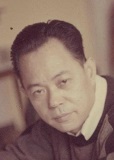
周藍萍(1926-1971),華語流行歌曲創作者、電影配樂家。湖南省湘鄉人。抗戰時就讀重慶中央訓練團音樂幹部訓練班第三期,後投筆從戎,任職國防部演劇隊二十二隊。1948年到臺,1949年參與拍攝電影《阿里山風雲》,插曲〈高山青〉應是由周藍萍定譜,至今廣受歡迎。1952年,進入中國廣播公司音樂組擔任特約歌詠指導與作曲專員。1955年開始參與電影配樂,為《王哥柳哥遊臺灣》(臺語片)、《水擺夷之戀》等電影配樂。1962赴港,為黃梅調電影《梁山伯與祝英台》(1963)配樂,開啟一個世代的黃梅調風潮,成為臺港炙手可熱的配樂家。他三度獲得金馬獎最佳音樂,和一座亞洲影展最佳音樂獎,為1960年代在亞洲最受注目的電影配樂家。周藍萍創作的華語歌曲超過三百餘首,〈綠島小夜曲〉與〈美麗的寶島〉等為其代表歌曲。
CHOU Lan-Ping, born in 1926, was a post-war composer and a super star in the field of Mandarin popular music and film music. His representative works include the widely-known songs, such as “Green Island Serenade,” “I'd Like to Marry a Han Man,” and “Beautiful Formosa ,” and the music for the “Huangmei Opera” film- “Butterfly Lovers” (1963), which made him become one of the best film composers in the Chinese film circle. He composed hundreds of songs and more than 100 film music pieces. He also received the award of “Best Original Film Song” from the Golden Horse Awards three times and the award of “Best Music” from Asia Pacific Film Festival. CHOU had an fairly unstable life: being born in mainland China, becoming a budding composer in Taiwan, and reaching his professional climax in Hong Kong. He is considered as the pioneer of Mandarin popular music and the first song writer who includs the subject of Taiwan in Mandarin popular music. His musical works express nostalgia of Chinese culture, combine Taiwanse elements, and present his imagination of Taiwan as hometown. CHOU died in 1971.
